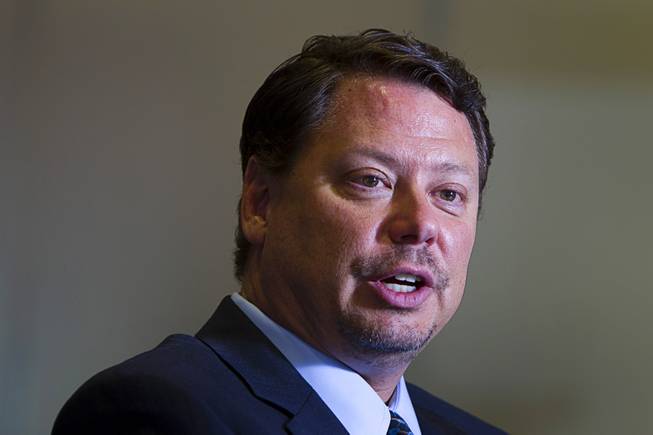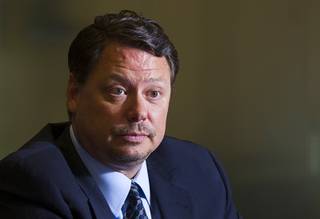
Pat Skorkowsky, Clark County School District superintendent, responds to a question during an editorial board meeting at the Las Vegas Sun offices in Henderson June 11, 2013.
Wednesday, June 12, 2013 | 2 a.m.
Pat Skorkowsky has big plans to move the Clark County School District forward.
The new superintendent sat down with the Sun's editorial board on Tuesday to share his vision for the nation's fifth largest school district.
The Oklahoma native and 25-year veteran of the district touched upon a myriad of topics, from English-language learner support and teacher evaluation systems to reform efforts and discipline issues.
Here's what he had to say, condensed for clarity and brevity:
-
On education reform:
I am a reformer. When former superintendent Dwight Jones came to the district and began changing the face of the district, I was fortunate enough to be at the table with him. Many of the initiatives that were brought forward were conceptual at the superintendent and deputy superintendent levels. I was given the task of implementation on a lot of these reform efforts. Working in the district during that time period gave me that opportunity to push forward that reform effort.
One of the challenges Dwight had was not knowing the system well. He was a great man and he was able to learn quickly, but he had to rely on others around him to navigate some of the pieces or to break down the walls within the system. I already have that piece in place.
We're doing an analysis over the summer of senior data to determine if the money we've put into these reform efforts have given us the achievement that we expected. If not, we need to rethink and refocus that money into something that is going to give us better results. I'm not ready to share them yet, but there are some reforms we've put into place that I'm not sure we're seeing the achievement bumps that we were expecting. We've got to look at return on investment every step of the way.
On English-language learner students:
What our classrooms looked like 25 years ago when I started is very different now. We see a higher percentage of second-language students who aren't graduating anywhere near where they need to be.
They don't have access to the curriculum because they don't have access to the language. But we know that language isn't a barrier to intelligence. With some of the money that the governor and the Legislature gave us this last session, we've got to focus in on our second-language population. That has to be a priority No. 1.
Approximately 15 schools are going to be identified as "zoom schools," which is the governor's and the Legislature's effort to meet the needs of English-language learners. We're going to go in and basically kickstart those schools.
We're going to add pre-kindergarten programs to our schools that don't have them and full-day kindergarten. We're going to reduce class sizes in kindergarten to third grades to ensure that our students get individualized instruction so that language development can take place. We're going to focus in on reading development centers through a partnership with UNLV. We'll focus in on summer school. But we can't stop there since it's only in 15 schools.
On the development of a new teacher evaluation system coming 2014-15:
I support the new state evaluation system 100 percent. I was heavily involved with the Teachers and Leaders Council (a state-level education committee) in its development.
Is it going to be easy to implement? No. When you look at any state or district out there who has put accountability into their teacher evaluation system, there have been challenges, both legal and within the employee groups and the system itself.
We're focusing in on the professional practices of our teachers in the classroom and administrators. We have to teach our teachers and administrators the new rubric, what the standards look like and how to ensure the consistency for administrators because that's one of the challenges we've had for years.
We have to ensure that our teachers have quality feedback on instruction. And it's not about a piece of paper with an evaluation. It's about that ongoing feedback throughout the year. So it's supervision, not just evaluation.
On Nevada's new law that increases teachers' probationary period before gaining tenure from one year to three years:
Every student and every family deserves the best quality teacher in their classroom. We have the expectation that every student will see a minimum of a year's academic growth underneath that teacher's care.
Going to a three-year probationary period was huge. At any point in three years, they can be removed from teaching. So that gives us a little more leverage.
If teachers are unsatisfactory, then we're able to work through a system where we are monitoring and ensuring that they are meeting the standards. If they are not meeting the standards, then we're providing assistance to them. If they're not successful by the third year, the new law allows us to counsel them that this isn't the best career for you at this time. We need that ability.
Nobody wants to have their student go through a year of bad instruction. No one wants their student to fall further and further behind.
On working with the union on the new teacher evaluation system:
We have been working closely with the Clark County Education Association this past year on this whole piece. We have to work with our teachers on this process. It has to be a joint process.
We're working with the Teachers and Leaders Council to ensure that we have the best quality standards in place and the best training for our teachers and administrators so that we're able to do that in a fair and equitable manner without all of the challenges that other states and districts have seen.
You have to be able to work with the union, but not be afraid to say this is not the teacher you would want your child in their classroom. It is a challenge always to tell somebody that they're not cutting it. But you do it a professional manner so that you're not attacking the person, you're attacking the performance.
But we have to make tough decisions. We've got to be more aggressive when it comes to an evaluation system. We can't afford to let these teachers come back if they're not getting the best results from their students.
On education funding in Nevada:
We have asked and asked and asked for money in the past. Sometimes it's come through. Sometimes it hasn't.
We got about $38 million for English-language learners and we got class size reduction for kindergarten on top of that. We got a little bump in per-pupil funding, but it's not significant. It's not going to make a difference. We still have to do more with less and we've had to do that for years and years.
We have to be careful in lobbying for more state funding. We're not out to hurt the rural counties or any other county. What we are out to do is get our fair share. With over 70 percent of Nevada's student population here, getting this amount of funding per pupil is not right. It's not fair. We're not getting it.
If we had the ability to tax through the legislative system, it would be great. Right now we currently don't. But I'm never going to ask for more money without putting a system of accountability into it and determining the return on investment.
On his biggest worry:
Our class sizes are larger than they've ever been. We staff at 38 student to 1 teacher in secondary schools and we staff at 34 to 1 in our fourth and fifth grade and 30 to 1 in elementary. It's ridiculous.
When we staff at 38, that doesn't mean our class sizes are at 38. It means that some of our classes get extensively larger. I've had high schools that have put English classes into lecture halls within their building and teaching it like a college class. That's not going to help our students get better. I think our teachers get burned out and exhausted when we add more students to classrooms.
On the disproportionate impact of expulsions of black students:
If you're an African-American male, the Office of Civil Rights came out with a report that said you're three times more likely to be suspended or expelled. We can't tolerate that.
So we're looking at major reform efforts within our schools to keep those kids in schools and not have them go out to behavioral schools or continuation schools unless they have committed extreme acts that deserve an expulsion.
The minute we recommend a child or student to go outside of the district, the chances are significantly increased that they will become a dropout. They say the school has disassociated with me, so I'm disassociating with education.
We have to break this cycle. If we can get a student reading by third grade, the chances of discipline decreases significantly. We have to find better strategies to get reading levels up districtwide. High school principals will tell me that if students come in reading at grade level, then they can teach them and get them to graduate.
On Teach for America:
We all see the value of Teach for America. It takes students who have graduated from top colleges to come at education from a social justice perspective, that every child deserves the best and the brightest.
Some of our toughest schools are moving toward being fully staffed in years because we are using Teach for America teachers in those hard-to-fill areas.
Our biggest fear is that they won't stay with us because oftentimes, they become phenomenal teachers but they don't stay with us after that two-year commitment. We have to keep them because we can't invest so much time and money and effort into these teachers to have them go away after two years.
On charter schools:
I think charter schools obviously have a place. It's an essential piece of the educational environment right now.
We have seven district-approved charter schools and we work very closely with them to ensure that they have that opportunity for success. Their teachers are provided opportunities for professional development. So are their administrators. We have to see charter schools as a partnership because they teach our kids.
I think there are opportunities for other charter schools in the future. I'm just not sure how they are going to fit in with our system of reforms.


Join the Discussion:
Check this out for a full explanation of our conversion to the LiveFyre commenting system and instructions on how to sign up for an account.
Full comments policy